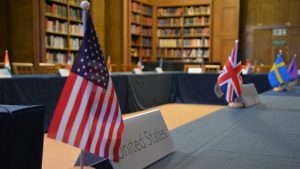

Preserving international peace & security
Security Council
The Charter of the United Nations entrusts the Security Council with the “maintenance of international peace and security” and gives it responsibility for ensuring “prompt and effective action by the United Nations”.
To realise these aims, the Charter grants the Security Council unique authority to pass resolutions that are binding on all Member States and it is the only UN body that can authorise military force.
With a membership restricted to just fifteen countries, the Security Council is designed to react rapidly and decisively in response to evolving global security crises.
Our simulation tests the ability of the crisis to cope with such crises. The scenario considers the worsening political, security and human rights situation in a fictitious country. The scenario is designed to engage with some of the most pressing global threats and current scholarly debates in the field of security studies.
The simulation is fast paced and challenging, requiring delegates to build relationships, develop consensus and make decisions under time pressure.
Delegates are updated on the crisis using crisis management training software used for preparing real-life diplomats in how to deal with genuine international crises.
An exciting media element includes TV stakeout interviews with professional broadcasters. Using specialist software, delegates will also have to manage simulated social media accounts and the email inbox of their mission. They will receive full professional training in social media and broadcast interview techniques.
By the end of the conference, delegates will acquire an understanding of the capabilities and limitations of the Security Council while providing effective and timely responses to emerging threats to international peace and security.
Participation in our Security Council is designed to be the ultimate test of MUN skills and is best suited to experienced delegates.
Each Member States will be represented in the Security Council by two delegates.
Delegates may not participate in our Security Council more than once.